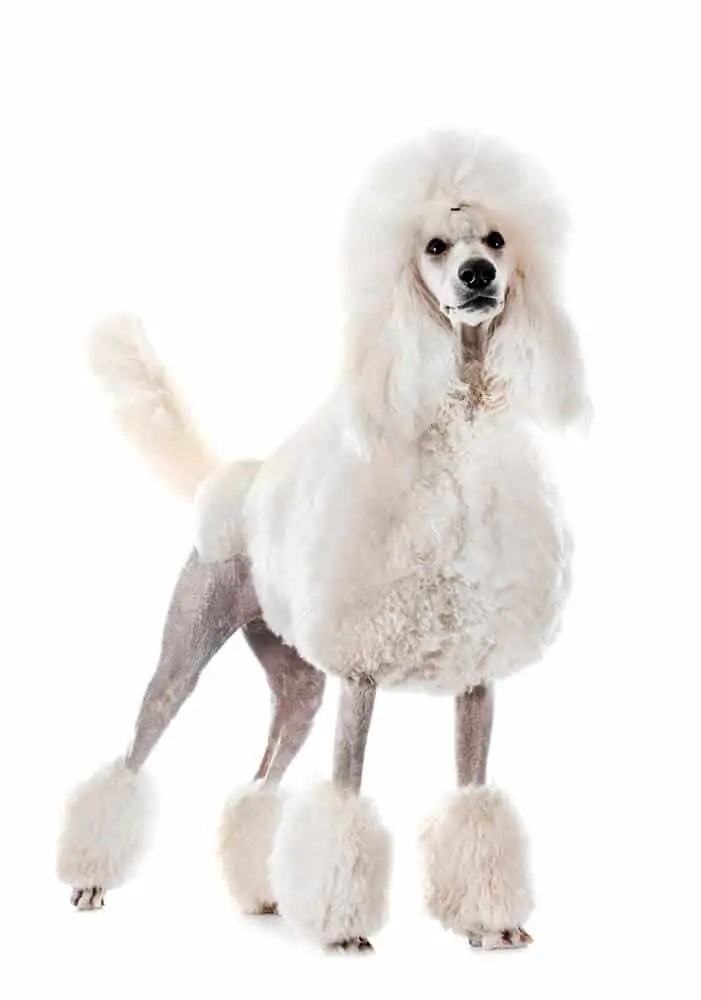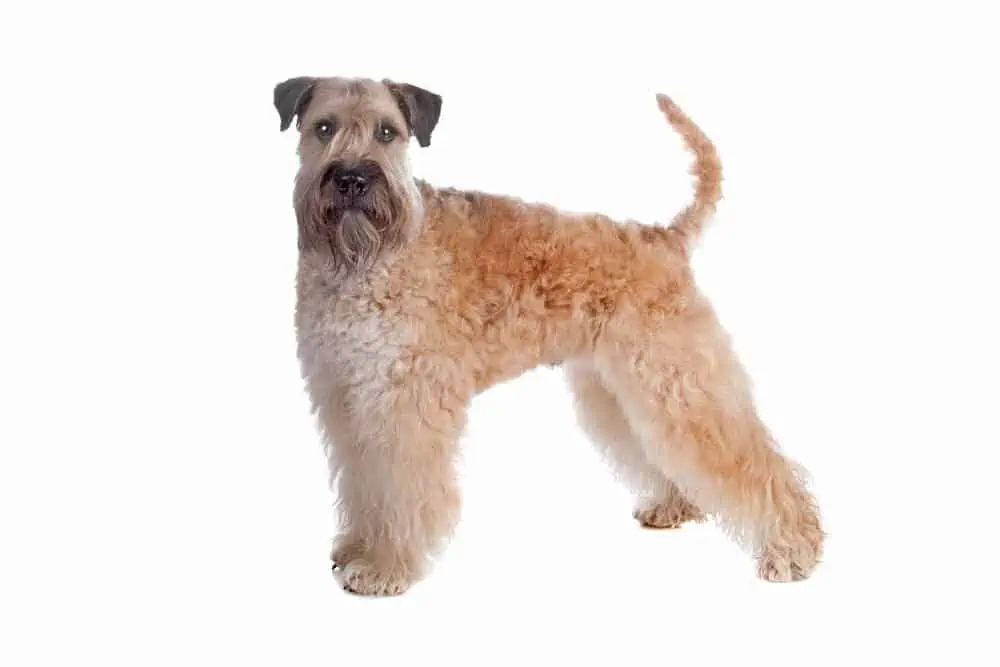Last Updated on
Poodles have always been a well-loved dog breed, but recently, Poodle mixed breed dogs have been taking the pet world by storm.
One of the newer Poodle mixed breeds is the Wheaten Terrier Poodle Mix, known as a Whoodle.
This article will explore this fascinating breed’s temperament, appearance, and more.
So whether you’re a first-time dog parent, a Doodle enthusiast, or simply interested in hybrid dogs, stick around and discover what makes Whoodles such friendly and lovable dogs. Let’s jump right in!
Wheaten Terrier Poodle Mix: Characteristics
| Height | 12 to 20 inches |
| Weight | 20 to 60 lbs |
| Lifespan | 12 to 15 years |
| Temperament | Playful, alert, energetic, affectionate |
| Colors | Black, gold, red, white, cream |
| Coat | Soft and wavy or soft and curly coat |
| Other names | Wheatendoodle, Swheat-n-poo, Sweatenpoo, Wheatenpoo, Soft Coated Wheaten Terrier Doodle |
What’s a Whoodle?
A Whoodle is a cross between a Soft Coated Wheaten Terrier and a Standard Poodle. Whoodles are typically medium-sized dogs and they tend to have low to non-shedding coats, thanks to their parent breeds.
The Whoodle is also known as a designer dog, which is just a fancy way of saying they’re a mixed breed.
Although the Whoodle isn’t recognized by the American Kennel Club, they are recognized by the Designer Dogs Kennel Club, the American Canine Hybrid Club, and the International Designer Canine Registry!
Temperament and personality
Both Poodles and Wheaten Terriers are known for their intelligence, stamina, and hunting expertise. Let’s take a closer look at the parent breeds to better understand what the Whoodle is like!
Poodles

Poodles are often considered the national dog of France and were actually originally bred to be duck hunters.
But it’s not just their hunting skills that make them impressive. Poodles are also known for being one of the smartest dog breeds. They’re easy to train and love to please their owners.
In fact, there are three different sizes of Poodles to choose from: the Standard Poodle, the Miniature Poodle, and the Toy Poodle.
Soft Coated Wheaten Terrier

The Soft Coated Wheaten Terrier is a lovable and energetic breed known for their friendly and affectionate disposition.
Originally bred in Ireland to be a herding dog, Wheatens are now popular as family pets thanks to their lively personality and silky low-shedding coat.
Wheatens are intelligent and eager to please, making them easy to train. They require regular exercise and grooming to keep them healthy and happy.
Whoodle
Now that we know about each parent breed, let’s learn about the personality and temperament of the Whoodle.
Intelligent
Whoodles are highly intelligent dogs who are easy to train.
They pick up new commands quickly and love to learn new things. They’re also great problem solvers and enjoy playing with treat puzzles or learning new tricks.
Playful
Whoodles are known for their playful temperament and love for long playtime sessions with their owners.
They’re energetic dogs who love to bounce around, run, and play games. They’re always up for a game of fetch or a run in the park!
Additionally, their intelligence and athleticism make them perfect for a variety of dog sports, such as agility training or obedience competitions.
Affectionate
Whoodles crave attention and love to cuddle up with their family members.
They’re loyal dogs who will follow you around the house and want to be involved in everything you do.
Their affectionate nature makes them great family pets and companions.
Alert
Whoodles are alert dogs who are always on the lookout for potential threats or dangers. They’re great watchdogs and will bark to alert their owners if they sense any danger. However, they aren’t aggressive and don’t make good guard dogs.
Energy
As a hybrid of two highly active dogs, the Whoodle needs plenty of daily exercise and mental stimulation to keep them happy and healthy.
Whoodle owners recommend giving them 60 to 90 minutes of exercise each day, including walks, runs, jogs, and hikes.
On top pf physical exercise, these intelligent dog need plenty of mental enrichment throughout the day. They love playing with puzzles, taking part in training, and playing with interactive toys.
Socialization
The Whoodle is a sociable dog that enjoys being around other dogs and small children. Their friendly nature allows them to become friends with anyone they come across.
However, early socialization is necessary if you want your Whoodle to be comfortable and confident around strangers and other animals. Here are some tips for socializing your Whoodle:
- Start early: Socialization should start as early as possible, ideally when your Whoodle is a puppy. Puppies are more open and receptive to new experiences, making it easier to introduce them to new people, places, and animals.
- Positive experiences: Make sure to create positive experiences during socialization. Reward your Whoodle with treats, praise, and playtime when they behave well around other dogs, people, and animals!
- Gradual introduction: Introduce your Whoodle to new experiences gradually in a controlled environment. Start with less intimidating situations and work your way up to more challenging ones.
- Consistency: Consistency is key when it comes to socializing your Whoodle. Make socialization a part of their daily routine and keep it up throughout their life.
- Socialization classes: Consider enrolling your Whoodle in a socialization class. These classes are a great way to expose your dog to new experiences and ensure they learn good behavior around other dogs and people.
Appearance
Height and weight
Whoodles are adorable pups that come in different sizes, making them perfect for different lifestyles and living arrangements. They usually weigh 25 to 60 pounds and can grow up to around 20 inches tall. But as with many designer breeds, their size largely depends on their Poodle parent.
If breeders cross a Mini or Toy Poodle with a Wheaten Terrier, the result will likely be a Miniature Whoodle. Mini Whoodles weigh between 25 and 30 pounds and grow 10 to 17 inches tall.
Color
Soft Coated Wheaten Terriers are known for their distinctive and beautiful coat color, which is commonly referred to as “wheatens.” These colors can vary from a light beige to a rich, shimmering gold, and may even include darker hues of red or brown.
Poodles, on the other hand, also have diverse coat colors ranging from black, white, brown, apricot, cream, blue, silver, gray, and red.
When it comes to Whoodles, their coat color can be just as unique and diverse as their parent breeds. Whoodles come in a variety of coat colors, including red, black, white, apricot, cream, brown or mahogany, silver, and grey.
The color of a Whoodle’s coat ultimately depends on the specific colors of its parents, so it’s always a bit of a surprise until they are born. And to add even more diversity to the mix, a Whoodle’s coat can be a single color or a combination of different colors, making each Whoodle truly one-of-a-kind!
Coat
These little puppies can have soft and wavy or soft and curly coats, and they have medium-length coats.
Poodles have a non-shedding and there are some chances that the Whoodle may inherit it from its Poodle parents. However, there is no such guarantee.
Grooming
Whoodles inherit their parents’ luxurious coats that require lots of care and attention from their owners. Their soft, curly/wavy fur is prone to matting, so it’s essential to give them proper grooming. Brushing their fur frequently is a must to keep it tangle-free.
In addition to brushing, taking your Whoodle to professional groomers every six to eight weeks is recommended. They can remove any excess dog hair, trim their nails, and give them a nice, clean bath.
You can also try grooming your Whoodle at home, but keep in mind that grooming a Doodle is exhausting. It’s often worth the price tag of the groomers to take them to a pro!
Health issues
By choosing a reputable breeder, you can reduce the likelihood of many health issues in your Whoodle.
However, like their Poodle and Soft Coated Wheaten Terrier parents, Whoodles are susceptible to certain illnesses, including:
- Hip dysplasia: This is a condition where the hip joint doesn’t form properly and can lead to arthritis and pain.
- Progressive retinal atrophy: A degenerative eye disease that can lead to blindness.
- Allergies: Both breeds can be prone to allergies, which can cause skin irritation and itching.
- Addison’s disease: A hormonal disorder where the adrenal glands don’t produce enough hormones, causing weakness, vomiting, and low blood sugar.
- Von Willebrand’s disease: A blood disorder that affects clotting and can cause excessive bleeding.
Lifespan
Whoodles live to be around 12 to 15 years of age. You can keep your Whoodle happy and healthy by feeding them quality dog food, giving them enough exercise, and taking them to the vet when needed.
Where to find Whoodle puppies
Dog rescues
Getting a Whoodle from a Poodle-mix dog rescue can be a great way to give a loving home to a dog in need. These rescues specialize in finding homes for mixed-breed dogs, including Whoodles. By adopting from a rescue, you are not only saving a dog’s life, but you are also giving them a second chance at a happy and healthy life.
When adopting from a rescue, it’s important to keep in mind that the dog may have come from a difficult situation, so patience and understanding are key.
Additionally, many rescues provide training and support resources to help new owners and their dogs adjust to their new life together. It’s important to do your research and find a reputable rescue that has a good track record of caring for their dogs and finding them suitable homes. By adopting from a rescue, you are not only giving a dog a second chance at life, but also gaining a loyal and loving companion.
Reputable breeders
You can also find Whoodle puppies from reputable breeders.
The first step in choosing a reputable Whoodle breeder is to do your homework. Research the breed and learn everything you can about their temperament, grooming needs, exercise requirements, and health issues (basically, everything we’ve covered in this post).
Knowing this information can help you determine what questions to ask a breeder and what traits to look for in a puppy.
Once you have a good understanding of the breed, it’s time to start looking for a breeder.
When you have a list of potential breeders, it’s time to start asking questions. A reputable breeder should be willing and able to answer all your questions thoroughly and honestly. Some questions to ask include:
- How long have you been breeding Whoodles?
- How many litters do you produce each year? (The fewer, the better as people should be breeding dogs ethically and not for profit)
- What is the temperament of your breeding dogs?
- Can I meet the parents of the puppies?
- Have the parents been tested for any health issues?
- Can I see the results of their health tests?
- Do you provide a health guarantee for your puppies?
- What is your policy on returning a puppy if I cannot keep it?
- Can you provide references from past puppy buyers?
A reputable breeder will be happy to answer all of your questions and provide any necessary documentation to back up their claims. If a breeder seems hesitant or evasive, this could be a red flag, and it’s best to look elsewhere.
Cost
If you Google “how much does a Whoodle cost?” you’ll find a massive range, with some sites saying Whoodles cost $1,000 and others saying they cost $6,500 and up.
One thing’s certain: buying from a reputable breeder can be expensive.
If you’re looking for a more affordable option, you can consider adopting a Whoodle from a dog rescue or shelter (as we’ve already discussed above). Adopting a dog can be significantly cheaper than purchasing one from a breeder.
Why you shouldn’t get a Whoodle
Ok, we’ve learned what makes the Whoodle so great, but what about the cons of owning one? Here are a few reasons why you shouldn’t get a Whoodle:
- High-maintenance coats: Whoodles require a lot of grooming and attention to keep their coat healthy and tangle-free. If you don’t have the time or energy to commit to regular grooming, a Whoodle may not be the right choice for you.
- Separation anxiety: Whoodles can become very attached to their owners and may experience separation anxiety when left alone for long periods. If you work long hours or travel frequently, a Whoodle may not be the best fit for your lifestyle.
- High energy: Whoodles are an active breed that require plenty of exercise and mental stimulation. If you cannot provide enough exercise and playtime, a Whoodle may become bored and destructive.
- Not 100% hypoallergenic: While many assume that all Poodle mixes are hypoallergenic, this is not true. No dog is 100% hypoallergenic. If you or a family member has allergies, it’s essential to spend time with the dog you wish to add to your family before committing to one. And speak with an allergist. With allergies, people are allergic to the protein found in the dog’s dead skin cells, urine, and saliva. That means that a low-shedding dog won’t stop your allergies if they are severe. You can still be highly allergic to the urine or saliva.
Overall, while the Whoodle is a wonderful breed with many positive traits, it’s important to carefully consider the potential drawbacks before deciding to bring one into your home.
Summary
In conclusion, the Whoodle is an excellent dog breed for experienced and first-time dog owners.
They are friendly, sociable, and adaptable dogs that fit well into any family.
As a hybrid dog breed, they are a mix of two purebred dogs, giving them unique characteristics that make each Whoodle slightly different.
Ultimately, whether you choose a Whoodle or another dog breed, it’s important to remember that each dog is an individual with their own personality and needs. As responsible dog owners, it’s our duty to provide them with proper care, love, and attention.
This article may include affiliate links. www.travellingwithadog.com is a participant of Amazon.com Services LLC Associates Program. As an Amazon Associate, I earn a commission from qualifying purchase. www.travellingwithadog.com participates in other affiliate programs, and recieves commissions when purchases are made through the links. The cost is not inflated to account for the commission earned.
Veterinary Disclaimer: travellingwithadog.com is not a substitute for veterinary advice and does not intend to provide any type of veterinary advice for your animals. Please consult your vet for any questions you have regarding your pets health.

About the Author:
Dana owns a Sheepadoodle and a rescue merle Labradoodle. Her first dog growing up was a white Toy Poodle and she’s loved dogs ever since. She has years of experience fostering dogs and has helped find homes for a variety of different breeds, both large and small! After seeing so many dogs end up unwanted and in shelters, she began blogging about different dog breeds (specifically Doodle dogs, since that’s what she knows best) to help people make informed choices when adding a new member to their family.
When Dana’s not brushing her Doodles’ hair (it takes a lot of time for two!) you can find her playing nose work games and fetch with her two amazing pups.
Learn more about her here.
